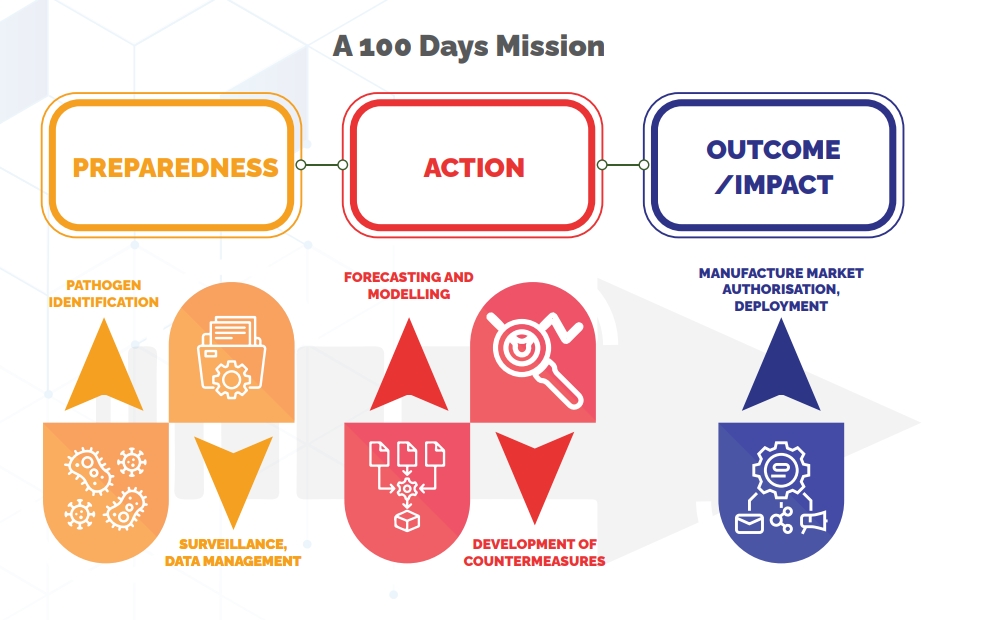NITI Aayog’s Framework for Future Pandemic Preparedness

- 02 Dec 2024
Introduction
In response to the evolving threat of pandemics, NITI Aayog has released an Expert Group report titled "Future Pandemic Preparedness and Emergency Response — A Framework for Action." The report offers a strategic blueprint for India to enhance its pandemic preparedness, drawing from the lessons learned during the COVID-19 crisis and global best practices. This framework aims to create a rapid, well-coordinated response system for future public health emergencies.
Rationale Behind the Expert Group
The COVID-19 pandemic underscored the vulnerability of global and national health systems to emerging infectious diseases. As future pandemics are inevitable, especially with increasing zoonotic threats, India has taken a proactive step in planning for such eventualities. The WHO has warned that 75% of future pandemics may be zoonotic, caused by pathogens transmitted from animals to humans.
Key Findings from COVID-19 Response
India's response to COVID-19 highlighted several strengths and weaknesses in the public health system. Key efforts included developing vaccines, enhancing research and development frameworks, and deploying digital tools for data management across its 1.4 billion population. However, gaps were identified in governance, data management, and cross-sectoral coordination. These lessons have been integrated into the expert group’s framework for future preparedness.
The 100-Day Response Framework
A crucial aspect of the report is the emphasis on the first 100 days of a pandemic. The expert group argues that a rapid response within this period is essential for minimizing the impact of any outbreak. The framework outlines a detailed roadmap for preparedness, which includes tracking, testing, treating, and managing outbreaks efficiently. A robust system for quick deployment of countermeasures, including vaccines and treatments, is pivotal during these critical days.
Four Pillars of Pandemic Preparedness
The report's recommendations are organized around four pillars:
- Governance, Legislation, Finance, and Management:
- Proposes a new Public Health Emergency Management Act (PHEMA) to address modern pandemic needs.
- Creation of an empowered group of secretaries (EGoS) for rapid decision-making and coordination.
- Data Management, Surveillance, and Predictive Tools:
- Calls for a unified data platform to aggregate and analyze data for timely decision-making.
- Emphasizes strengthening genomic surveillance and establishing a national biosecurity network.
- Research, Innovation, and Infrastructure:
- Recommends a high-risk innovation fund to support research on diagnostics, vaccines, and therapeutics.
- Suggests enhancing manufacturing capacity and building biosafety containment facilities.
- Partnerships and Community Engagement:
- Stresses the importance of private sector involvement and community engagement in managing pandemics.
- Proposes a risk communication unit at the National Centre for Disease Control (NCDC) to manage public information and prevent misinformation.
International and National Collaboration
The report underscores the need for cross-border collaboration, aligning India’s efforts with international frameworks such as the WHO’s revised International Health Regulations and the Pandemic Accord negotiations. Collaboration with global institutions, academia, and the private sector is essential for sharing data, technology, and expertise during health crises.
Lessons from Past Epidemics
The report draws lessons from several past epidemics, including SARS, H1N1, and Ebola, which revealed the importance of timely diagnostics, coordinated surveillance, and rapid response. These lessons highlight the need for stronger international regulations, integrated data systems, and enhanced public-private partnerships in tackling future pandemics.
Conclusion and Recommendations
The framework offers actionable recommendations to strengthen India’s pandemic preparedness. From institutionalizing governance structures and creating a dedicated pandemic fund to enhancing surveillance and fostering innovation, these steps are designed to ensure rapid response and minimize the impact of future health crises. By focusing on governance, data management, research, and community partnerships, India aims to build a resilient health system capable of facing future challenges effectively.
